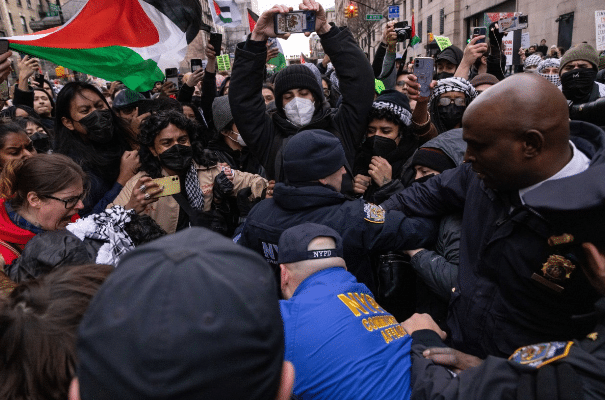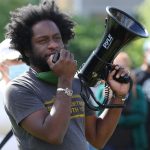Over the last several months, the movement in solidarity with Palestine has gone through several phases. The global movement raised the general awareness of the situation in Palestine and opened up the state of Israel and Zionism to a level of criticism and questioning that they have not seen since Israel’s inception. Even the United Nations Special Rapporteur recently concluded that there “are reasonable grounds to believe the threshold indicating Israel’s commission of genocide is met.” To bring this truth to light, the global movement has had to overcome repression aimed at silencing it under the false claim that anti-Zionism is antisemitism. Two recent examples of this internationally are in Germany, where thousands of police were deployed to prevent a conference on Palestine from taking place, and France, where pro-Palestine activists are being labeled as terrorists.
In the U.S., particularly at colleges and universities, where the movement has been the strongest and most active, the repression has intensified, reaching McCarthyite levels that should concern everyone in the U.S. In fact, Congress held a hearing about antisemitism on college campuses, where Republicans grilled university presidents about their commitment to fighting antisemitism. This hearing, however, was not about combating antisemitism. Rather, it was about pressuring university administrations to clamp down on the movement in solidarity with Palestine in particular, and progressive campus organizing in general.
This McCarthyite hearing forced the resignation of two university presidents — former University of Pennsylvania president Liz Magill, and former Harvard University president Claudine Gay. Uncoincidentally, the ramp-up of repression on college campuses preceded a congressional hearing today, April 17, featuring Columbia University president Minouche Shafik.
A National Policy with Columbia University at the Center
Columbia University has been an important arena of struggle for the movement in solidarity with Palestine. It is an elite institution that plays a key role in the capitalist regime’s functioning, through its work on policy, research, and the training of new generations of bourgeois functionaries, intellectuals, and leaders. It is also an institution that — owing to its strategic role for U.S. imperialism — has strong ties with Israel.
These features have also made it an important place in the struggle in solidarity with Palestine, which has been able to grow there and play an important role in the movement nationally, especially since the movement’s growth after October 7 and the Israeli government’s latest military offensive, which has, to date, killed over 30,000 Palestinians, many of them women and children.
To weaken the movement, the administration has overseen some draconian forms of repression. Early on in the movement, Columbia University administrators banned two groups, Students for Justice in Palestine and Jewish Voices for Peace. This prompted students to form a new group, Columbia University, Apartheid, and Divestment (CUAD), which would continue organizing in solidarity in Palestine. Recently, the administration has gone further, suspending several students — after siccing a private investigator on them — and removing them from their housing on campus.
Columbia University professor Joseph A. Howly recently tweeted about the experiences of faculty working to defend pro-Palestine students from what he calls “draconian disciplinary hearings.”
In many ways, Columbia University has taken the lead in repressing the movement, though it is far from alone.
Students were arrested at a protest at Vanderbilt University on March 27, when the university administration took away students’ rights to amend the student government’s constitution to divest from Israel. A local reporter with the Nashville Scene was arrested for covering the protest.
At Pomona College, 20 students were arrested and jailed on April 5 — and some of them were later suspended from campus — for trying to prevent campus staff from removing a mock apartheid wall that they had built as part of a weeklong action in solidarity with Palestine.
On April 13, Students for Justice in Palestine (SJP) at Rutgers–New Brunswick canceled their “silent walkout” after university administrators threatened them with suspensions and expulsion.
Faculty have lost their jobs for speaking out for Palestine at CUNY, and a professor has been suspended from teaching at Hobart and Williams Smith College.
Where the Movement Is At, and Where It Needs to Go
To be sure, the repression of the movement is not limited to colleges and universities. Protesters in Detroit were detained and ticketed, protesters in New York were violently repressed, and activists in New Jersey are facing attacks from city officials for their weekly protest. Still, some of the most consistent protest activity has been on college campuses, especially over the last several weeks.
The Republicans are the motor force behind the congressional hearings. But the Democrats, for their own cynical reasons, are either helping repress the movement or declining to support it. For example, President Biden is very worried about looking “weak” on antisemitism as he and his regime publicly clash with Netanyahu and seek to dial down tensions in the Middle East.
The movement’s more radical edge is relatively isolated, while the rest of the movement has been funneled out of the street and into the Democratic Party primaries. Meanwhile, the state is ramping up repression to contain the radical elements and prevent them from having an impact on the larger movement. The state fears that the radical sector will influence the masses because it helped shape the discourse around Palestine. In fact, while the movement in the street has receded, the sentiment of solidarity with Palestine has expanded. In combination with the movement in solidarity with Palestine, the geopolitical tensions that have sprung from the current phase of conflict in Gaza has caused tension between Netanyahu and the Biden administration. Even Nancy Pelosi, who a few months ago claimed that pro-Palestine protesters are Russian plants, has now raised the idea of imposing conditions on arm shipments to Israel. Chuck Schumer, the first Jewish Senate majority leader, called for new elections in Israel, and Senator Elizabeth Warren used the word “genocide” to describe what is happening in Palestine. Of course, even with these rhetorical shifts, the Democrats remain resolute in their support for Israel, which shows the limits of a strategy aimed at “pressuring” them to change.
We Need a United — and Broad — Campaign against Repression
To deal with the isolation of the militant wing of the movement in the face of a general retreat of the movement from the streets, the movement needs to build a broad campaign not only to defend itself against attack, but also to beat back the obstacles that keep others from participating. It would be a welcomed relief to stop and reverse the suspensions that people are facing, and it would be a source of inspiration and courage for those who want to speak out but think it’s impossible to do so without having to pay a severe price for it.
In a recent interview with Left Voice, Aidan Parisi, a Columbia University social work student, said that “if we don’t all step up and ramp up, this will happen to other people. I don’t think we’re gonna free Palestine through our student movements. And that’s something that we have to recognize. But what we are going to contribute to [is] a larger movement that is working to free Palestine.”
Thankfully, there are efforts underway to combat the McCarthyite attacks on the movement. At Pomona College student tour guides, reacting to the crackdown on dissent, refused to work, and the faculty passed a resolution condemning “the present and future militarization and use of police on the campus.” Meanwhile, 250 people staged a walkout in support of the protesters facing repression.
On April 17, CUNY4Palestine held a march against retaliation and repression, and faculty at Columbia University held a rally against repression, which is especially important given the likelihood that a student occupation at Columbia University, announced this morning, has faced threats of repression.
This is the kind of action we need, and more of it. We need to make these efforts part of a nationally coordinated campaign against repression. Students and faculty at Columbia University, or Pomona College, or any other place facing repression can’t do it with their own forces. That is why we need a campaign that brings the full power of the movement to the struggle against repression and for democratic rights. We are facing powerful forces that coordinate nationally, so we must do the same.
Defend the Right of Protest and Free Speech!
Letting these political attacks go unchallenged sets a dangerous precedent. That is why we need a broad campaign that mobilizes everyone who supports a cease-fire, including unions like the United Auto Workers (UAW) Unions that represent academic workers under attack, like the American Association of University Professors (AAUP) and American Federation of Teachers (AFT) need to mobilize too. We also need civil rights and civil liberties groups, like the Council on American-Islamic Relations (CAIR) and the American Civil Liberties Union (ACLU). We need groups like JVP, SJP, PYM, and the PSL to take up the cause too. It has been a detriment to the movement that its leaders haven’t taken up a campaign against repression in a more concerted and centralized way. The movement has to correct that, which is also an important way to combat the movement’s splintering.
Those who fear authoritarianism should understand the stakes of this campaign. We need to disrupt the attempt of the state to normalize McCarthyism 2.0, and this campaign helps us do that.
The Struggle Is International
The movement in solidarity with Palestine is global, and thus so is the repression it faces. Therefore, as we build a national campaign against repression, we must also highlight and uplift campaigns taking place internationally. It is the international character of this struggle that gives it so much strength. Plus, we can link the liberation of Palestine to broader questions of freeing the working class and oppressed people across the globe. This will require an internationalist, anti-imperialist movement undertaken by an international organization that unites all the struggles together. After all, none of us are free until all of us are free.











